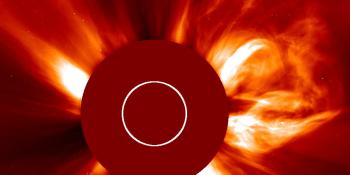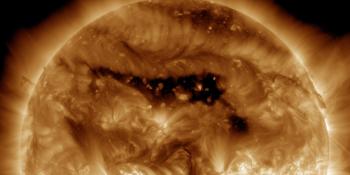Viewing archive of Wednesday, 18 March 2015
Select the desired archive item
Strongest geomagnetic storm of solar cycle 24
17 March 2015 - The St. Patrick's Day 2015 Geomagnetic Storm. That is the date that will be remembered by many people all around the world who witnessed one of the most intense auroral displays in years. What looked like a fairly average coronal mass ejection from only a C9 (!) solar flare that would give us a glancing blow and spark at most a minor G1 geomagnetic storm actually caused the strongest geomagnetic storm of solar cycle 24. Three periods were recorded yesterday where the severe G4 geomagnetic storm threshold was reached. The Dst or disturbance storm time index (which just like the Kp-index is a way to record the severity of a geomagnetic storm) reached -228 during the peak of the storm close to midnight UTC and means this storm was actually much stronger than the second strongest geomagnetic storm of solar cycle 24 that reached -147nT on 25 October 2011. We thus witnessed a unique event! Tech talk aside: a geomagnetic storm of this size gave many people around the world the chance to see the magical polar lights and capture them with their own cameras. We have been overwhelmed by all of your images that we got in our inbox. Thank you very much! Keep on reading for a selection of the most amazing images that we received of what truly was one of the best geomagnetic storms in years.
Latest news
Latest forum messages
Support SpaceWeatherLive.com!
A lot of people come to SpaceWeatherLive to follow the Sun's activity or if there is aurora to be seen, but with more traffic comes higher server costs. Consider a donation if you enjoy SpaceWeatherLive so we can keep the website online!

Space weather facts
| Last X-flare | 2024/12/08 | X2.2 |
| Last M-flare | 2024/12/23 | M1.0 |
| Last geomagnetic storm | 2024/12/17 | Kp5+ (G1) |
| Spotless days | |
|---|---|
| Last spotless day | 2022/06/08 |
| Monthly mean Sunspot Number | |
|---|---|
| November 2024 | 152.5 -13.9 |
| December 2024 | 106.6 -45.9 |
| Last 30 days | 116.1 -41.8 |


